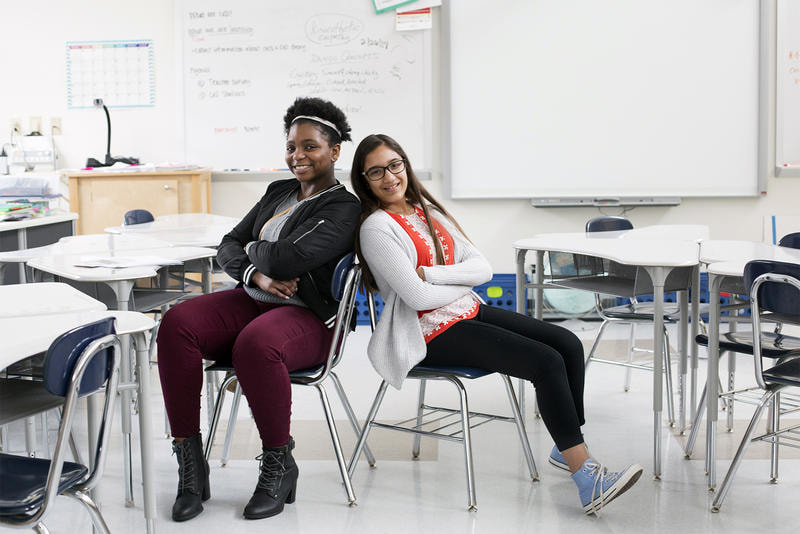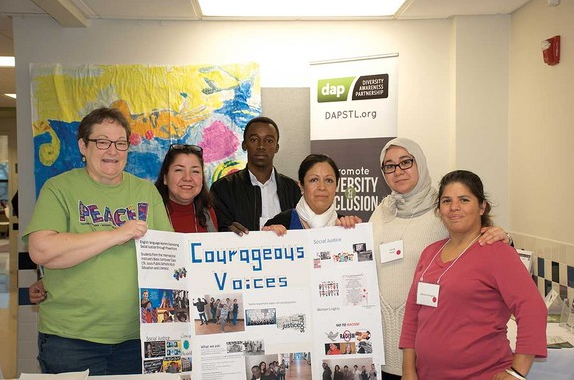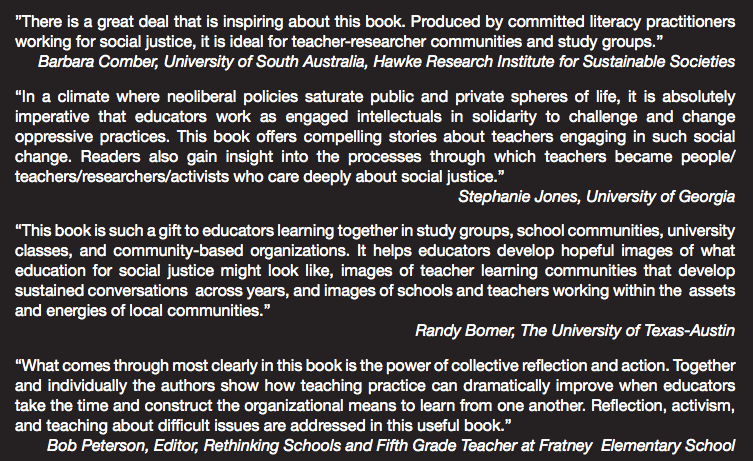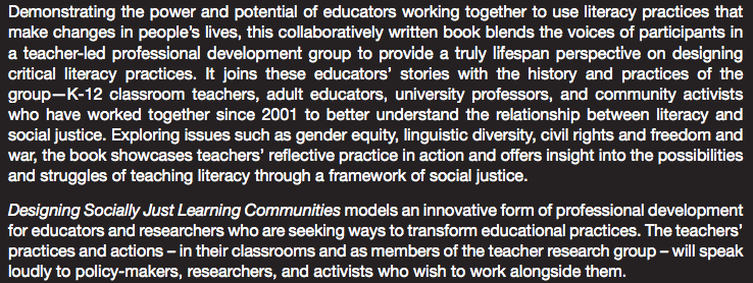ESJ Media Buzz
Carolina Hidalgo, St. Louis Public Radio
March 2nd, 2018 "When Anjali Adhikari and Niah Ester teamed up for a class project last summer, they had one goal – to teach educators at Northeast Middle School all about microaggressions.
"The seventh graders never imagined their work would make it from their Creve Coeur school into classrooms across the St. Louis region. But since then, they’ve created and led training sessions for dozens of teachers, counselors and school administrators.
Last Saturday, Niah and Anjali led more than three dozen teachers through their training activities during the annual Educators for Social Justice conference." Click here to continue reading.
March 2nd, 2018 "When Anjali Adhikari and Niah Ester teamed up for a class project last summer, they had one goal – to teach educators at Northeast Middle School all about microaggressions.
"The seventh graders never imagined their work would make it from their Creve Coeur school into classrooms across the St. Louis region. But since then, they’ve created and led training sessions for dozens of teachers, counselors and school administrators.
Last Saturday, Niah and Anjali led more than three dozen teachers through their training activities during the annual Educators for Social Justice conference." Click here to continue reading.
St. Louis Teachers Turn Their Classrooms into Hubs of Social JusticeOctober 12th, 2017
For some teachers, the Stockley case was a reminder about why they cover race, equity and social justice in their classrooms. Several of those teachers are part of a St. Louis-area group called Educators for Social Justice. Founded in 2001, the group supports and encourages teaching that challenges students to become involved in social change and to see history and current events from the eyes of the marginalized. The group... says in its mission statement that it works “to promote the idea that developing socially just curriculum is a form of activism.” At the group’s teach-in on Oct. 1, the educators assured their peers that it’s not only acceptable for them to teach about social justice, but expected. “We can’t wait until a Stockley verdict comes out in order to start talking about racial justice,” said Rebecca Rogers, an education researcher at the University of Missouri-St. Louis, former St. Louis school board member and a founder of Educators for Social Justice. “It has to be on the forefront of our agenda and in our teaching continually. We live in St. Louis … And this place has a particularly racist context.” Click here to read the full article. "Educating For Change" Conference brings educators together to help spark social change for students
March 08, 2017 A group of 350 teachers from schools across St. Louis gathered at Maplewood Richmond Heights Elementary School last month to hear keynote speaker Keith Catone address "Courageous Teaching and Civil Rights in the 21st Century." The talk was part of the "Educating for Change" conference on Feb. 4, sponsored by Educators for Social Justice — an organization in St. Louis connecting educators across districts to focus on social justice curriculum and change. In addition to hosting the conference, the organization sponsors an annual Courageous Educator Award and provides a $300 grant to support an educator-led initiative with an explicit social justice emphasis. Previous conferences have focused on topics such as peace education, immigrant and refugee rights, and creating spaces for social justice in an era of standardized testing. He challenged teachers to identify their purpose as educators – voices called out "get free," "develop empathy" – versus the purpose that authority figures pass down to teachers such as "college and career readiness," "passing the test." Click here to read full article. |
Area Teachers Hope to Bring Awareness to Social Justice Issues at Yearly Conference
February 3, 2017 St. Louis — Teachers from across the St. Louis area will gather for the 12th annual "Educating for Change Curriculum Conference," on Saturday hosted by the group Educators for Social Justice (ESJ). This year's theme is "Courageous Teaching and 21st Centrury Civil Rights," and the goal is to educate teachers from all grade levels about different techniques and strategies on how to facilitate social justice dialogue in classrooms. "Educators for Social Justice is a grassroots network of educators across the metro St. Louis area that is committed to social justice education in classrooms, schools and in the community," ESJ member Becky Rogers said. Rogers says their annual conference is one of the best tools they have to try and achieve their ultimate goal as a group. "Groups like Educators for Social Justice really provide the inspiration and the solidarity for teachers to come together to reclaim public education and their expertise and autonomy as teachers," Rogers said. Click here to read full article. |
Winter 2005/2006 - Volume 20 No. 2
All across the country, educators, parents, students, and community members are uniting to create social change — and improve teacher quality. The proliferation of these groups demonstrates the power of teachers working together to improve lives for students and teachers, both inside the classroom and out.
Though not a comprehensive survey, the article below describes some of the many ways these groups are making things happen, through workshops, curriculum fairs, teach-ins, discussion groups, and protests.
....
Inspired by the Chicago TSJ curriculum fair, another group, the Literacy for Social Justice Action Research Group (LSJTRG) in St. Louis, organized its first curriculum fair in the fall of 2005. The fair, called "Educating for Change," was a milestone for the group and included table demonstrations, workshops, and interactive presentations that connected education and social justice.
LSJTRG began in 2001 with hopes of building a supportive community for educators struggling to create a more just society. The group initially functioned as a place to share the best techniques for contributing to justice, inquire into classroom practices with other teachers, and envision more just classrooms, schools, and communities.
Today, LSJTRG boasts a diverse membership in terms of race, age, years of teaching experience, and teaching context. The group reads common texts, discusses these in relation to teaching practices, conducts action research, organizes for community activism, and participates in consciousness-raising workshops (for example, around labor rights and dismantling racism). All members receive free study group books and have access to various classroom resources for their own classrooms.
Members are also invited to attend an annual summer institute at the end of each year, which extends the research and builds upon the group's work of the previous year. In addition to hosting its first curriculum fair, LSJTRG has participated for several years in the International Reading Association's African American Read-In Day, as a form of support for other community organizations.
Click here to read entire article.
All across the country, educators, parents, students, and community members are uniting to create social change — and improve teacher quality. The proliferation of these groups demonstrates the power of teachers working together to improve lives for students and teachers, both inside the classroom and out.
Though not a comprehensive survey, the article below describes some of the many ways these groups are making things happen, through workshops, curriculum fairs, teach-ins, discussion groups, and protests.
....
Inspired by the Chicago TSJ curriculum fair, another group, the Literacy for Social Justice Action Research Group (LSJTRG) in St. Louis, organized its first curriculum fair in the fall of 2005. The fair, called "Educating for Change," was a milestone for the group and included table demonstrations, workshops, and interactive presentations that connected education and social justice.
LSJTRG began in 2001 with hopes of building a supportive community for educators struggling to create a more just society. The group initially functioned as a place to share the best techniques for contributing to justice, inquire into classroom practices with other teachers, and envision more just classrooms, schools, and communities.
Today, LSJTRG boasts a diverse membership in terms of race, age, years of teaching experience, and teaching context. The group reads common texts, discusses these in relation to teaching practices, conducts action research, organizes for community activism, and participates in consciousness-raising workshops (for example, around labor rights and dismantling racism). All members receive free study group books and have access to various classroom resources for their own classrooms.
Members are also invited to attend an annual summer institute at the end of each year, which extends the research and builds upon the group's work of the previous year. In addition to hosting its first curriculum fair, LSJTRG has participated for several years in the International Reading Association's African American Read-In Day, as a form of support for other community organizations.
Click here to read entire article.
|
Interview of Members of Literacy for Social Justice Teacher Research Group Educating for Change Curriculum Fair
Check out an interview about a previous Educating for Change Conference with teachers Rob Good, Genevieve Erker Caffrey and Mark Kasan on St. Louis Activist Radio. Listen to the interview. |
Professional Development as Social Transformation: The Literacy for Social Justice Teacher Research Group
A teacher research group documents their processes and changes over time as they explore the relationship between literacy and social justice in their classrooms. Read the entire article here. |
ESJ Testamonials
"In one of ESJ’s workshops, Meredith shared with us how she introduced gay rights in her classroom with young children. I was afraid of doing that, but she just naturally explained what she did and the reactions of her students. I remember thinking at the time, I can be prepared for that. I can do that, too. That is what ESJ does. They try to get people involved and creating social justice curriculum for themselves. They support teachers to try out curricular ideas and actions that they might not do by themselves."
-Cris Mann, Special Education Teacher
"Teaching about social justice is gratifying and exhausting. The ESJ conference empowers and validates this work, and allows you to "fill up" your heart and mind for the work ahead."
-Nicole Post, Conference Planner & Teacher
"ESJ is a very grassroots form of professional development. It is organic and it has many voices: students, faculty, teachers, community members. It is organic because the learning experiences emerge from the ideas of a lot of different people and not this preplanned professional development session where someone comes in and teaches us something. There are many personal connections. It is never a stale experience ever. You feel like your voice was heard. I think that was a very drastic change from the professional development traditionally offered to teachers."
-Michelle Perez, Associate Professor
"I’ve seen individual teachers be completed transformed by the Educating for Change conference every year. I watch life being breathed back into individual teachers and I know individual teachers that were about to quit or they were completely depressed in life because they just didn’t feel like they were making a different in their students and they were just being weighed down so many things. Then they went to the ESJ conference and it opened their eyes. You don’t have to feel isolated and alone.”
-Elementary teacher
“Every year I walk away from the conference feeling affirmed. It provides the opportunity to meet others who are working and hear their stories and see what they are doing and how it is effective. This conference is rooted in the teachers’ experiences and giving teachers the chance to showcase the good work they are doing..…”
-Adult education teacher
-Cris Mann, Special Education Teacher
"Teaching about social justice is gratifying and exhausting. The ESJ conference empowers and validates this work, and allows you to "fill up" your heart and mind for the work ahead."
-Nicole Post, Conference Planner & Teacher
"ESJ is a very grassroots form of professional development. It is organic and it has many voices: students, faculty, teachers, community members. It is organic because the learning experiences emerge from the ideas of a lot of different people and not this preplanned professional development session where someone comes in and teaches us something. There are many personal connections. It is never a stale experience ever. You feel like your voice was heard. I think that was a very drastic change from the professional development traditionally offered to teachers."
-Michelle Perez, Associate Professor
"I’ve seen individual teachers be completed transformed by the Educating for Change conference every year. I watch life being breathed back into individual teachers and I know individual teachers that were about to quit or they were completely depressed in life because they just didn’t feel like they were making a different in their students and they were just being weighed down so many things. Then they went to the ESJ conference and it opened their eyes. You don’t have to feel isolated and alone.”
-Elementary teacher
“Every year I walk away from the conference feeling affirmed. It provides the opportunity to meet others who are working and hear their stories and see what they are doing and how it is effective. This conference is rooted in the teachers’ experiences and giving teachers the chance to showcase the good work they are doing..…”
-Adult education teacher
ESJ Book Reviews
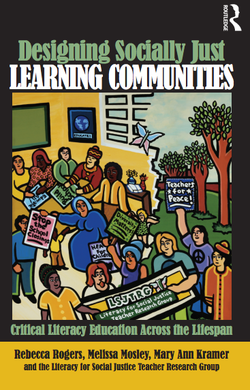
In May 2009, ESJ (formerally called Literacy for Social Justice Teacher Research Group) members wrote and published a book entitled Designing Socially Just Learning Communities: Critical Literacy Across the Lifespan. Demonstrating the power and potential of educators working together to use literacy practices that make changes in people's lives, this collaboratively written book blends the voices of participants in a teacher-led professional development group to provide a truly lifespan perspective on designing critical literacy practices. It joins these educators’ stories with the history and practices of the group − K-12 classroom teachers, adult educators, university professors, and community activists who have worked together since 2001 to better understand the relationship between literacy and social justice. Exploring issues such as gender equity, linguistic diversity, civil rights and freedom and war, the book showcases teachers’ reflective practice in action and offers insight into the possibilities and struggles of teaching literacy through a framework of social justice. Designing Socially Just Learning Communities models an innovative form of professional development for educators and researchers who are seeking ways to transform educational practices. The teachers' practices and actions – in their classrooms and as members of the teacher research group – will speak loudly to policy-makers, researchers, and activists who wish to work alongside them.
Here are some reviews of our book:
|
|
|

